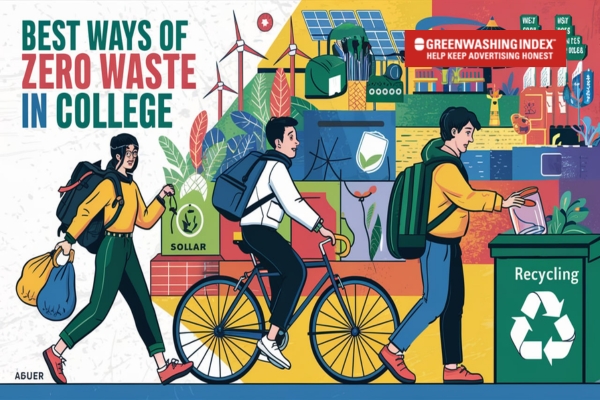

Stepping onto your college campus, eager to make a difference. You’re not just another student. You’re on a mission. A mission to embrace Zero Waste in College! It sounds daunting, right? But picture this: a campus where waste is minimized, resources are cherished, and sustainability is the norm.
As you navigate this exciting journey, you’ll uncover simple yet powerful ways to transform your college life and contribute to a cleaner planet. Let’s dive in and discover how you can make a lasting impact with Zero Waste in College.
Zero waste initiatives in colleges aim to significantly reduce waste production and promote sustainability. These programs involve various strategies, including recycling, composting, and encouraging the use of reusable materials. Many universities are actively engaging students, faculty, and staff in these efforts through competitions, educational campaigns, and innovative practices.

By fostering a culture of sustainability, colleges not only minimize their environmental impact but also create a more conscious community regarding consumption and waste.
Adopting a zero-waste lifestyle in college is not just an eco-friendly choice; it’s a transformative habit that can significantly impact your environment and personal well-being. By integrating sustainable practices into daily routines, students can contribute to reducing waste and promoting sustainability on campus. Here are ten effective strategies to embrace zero waste while navigating college life:
Using reusable containers for food and drinks is one of the simplest ways to reduce waste. Instead of relying on single-use plastic bags and containers, invest in high-quality, durable options like glass or stainless steel. These containers can be used for meals, snacks, and even leftovers from dining halls or restaurants.
Additionally, carrying a reusable water bottle not only cuts down on plastic waste but also encourages hydration throughout the day. By making this small change, you contribute to a significant reduction in plastic pollution.
Transitioning to digital resources can drastically decrease paper waste. Utilize e-books, online articles, and digital note-taking apps instead of traditional textbooks and notebooks. Many universities offer online libraries and resources that allow students to access materials without printing them.
Additionally, submitting assignments electronically helps minimize paper usage. Embracing technology not only supports a zero-waste lifestyle but also enhances organization and accessibility.
Most colleges have recycling programs in place, but participation can vary among students. Familiarize yourself with your campus’s recycling guidelines and actively engage in these initiatives. Encourage your peers to recycle by placing informative signs near recycling bins or organizing awareness campaigns.
Participating in campus clean-up events can also foster a sense of community while promoting sustainable practices.
Purchasing second-hand items is an excellent way to reduce waste while saving money. Thrift stores, online marketplaces, and college swap events offer a variety of pre-loved items, from clothing to furniture.
By choosing second-hand over new products, you extend the lifecycle of these items and decrease demand for new manufacturing processes that often generate waste. This practice not only benefits the environment but also promotes a unique style without the environmental cost.
Composting organic waste is an effective way to minimize landfill contributions while enriching soil health. Many colleges provide composting bins in dining areas or gardens; however, you can also create a small composting system in your dorm or apartment using kitchen scraps like fruit peels and vegetable trimmings.
Composting reduces methane emissions from landfills and provides nutrient-rich compost that can be used for gardening projects or community green spaces.
Switching from disposable paper products to cloth alternatives can significantly cut down on waste. Use cloth napkins instead of paper ones, and consider carrying a handkerchief instead of tissues.
For personal hygiene products, opt for washable menstrual pads or menstrual cups instead of single-use options. These changes not only reduce waste but also promote healthier choices for your body.
Meal planning is crucial for minimizing food waste. By preparing a weekly menu and creating a shopping list based on that plan, you can avoid overbuying groceries that may spoil before consumption.
Batch cooking meals that can be frozen for later use, ensuring that food does not go to waste while saving time during busy weeks. This practice not only supports zero-waste efforts but also encourages healthier eating habits.
Buying from local farmers’ markets reduces the carbon footprint associated with transporting food long distances while supporting local economies. Fresh produce often comes with less packaging than supermarket alternatives, making it easier to maintain a zero-waste lifestyle.
Engage with local vendors who prioritize sustainable practices and consider joining community-supported agriculture (CSA) programs for regular deliveries of seasonal produce.
Organizing events focused on sustainability can raise awareness about zero-waste practices within your college community. Host workshops on topics like DIY cleaning products or upcycling crafts, or arrange potlucks where attendees bring dishes made from leftover ingredients.
These gatherings foster community engagement while educating others about the importance of reducing waste.
Finally, become an advocate for sustainability on campus by engaging with student organizations or administration to promote zero-waste policies.
Propose initiatives such as eliminating plastic straws in dining halls or implementing more robust recycling programs across campus facilities. By actively participating in policy discussions, you can help shape a more sustainable future for your college community.
By implementing these strategies into your college life, you can transform your habits towards a more sustainable future while inspiring others to do the same.
Zero waste in college not only contributes to a healthier planet but also fosters personal growth and responsibility. By adopting sustainable habits, students can significantly reduce their environmental footprint while enhancing their college experience.
The journey towards zero waste involves mindful choices and a commitment to making a positive impact. By integrating these practices, students pave the way for a sustainable future, both on campus and beyond.
Dive into more insightful blogs on our site to continue your eco-friendly journey. Let’s make a difference together, one step at a time!
